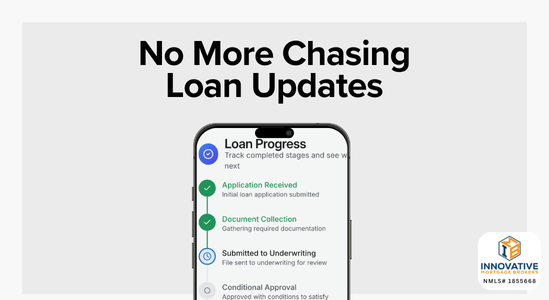Our new portal lets you securely check progress, milestones, and next steps anytime you want…
Two Essential Steps Before You Start Looking to Buy a Home
Two must-do actions that transform your homebuying experience from frustrating to fulfilling
Looking for a new home can be exciting—maybe you’re dreaming of that perfect backyard for a summer barbecue or picturing the cozy fireplace you’ll gather around during the holidays. But before you start browsing online listings and scheduling showings, there are a couple of things you should do to set yourself up for success: get preapproved for a mortgage and find a skilled, experienced real estate agent to guide you. These two steps can make your homebuying journey smoother, more efficient, and ultimately more rewarding.
In this article, we’ll explore why getting preapproved is such a crucial first move, then discuss the importance of choosing the right real estate agent—one with the kind of experience, support, and expertise that can truly make a difference. By tackling these two steps at the outset, you’ll give yourself a head start on finding and securing your dream home.
Step 1: Get Preapproved for a Mortgage
Before you begin looking at houses, it’s wise to understand what you can realistically afford. This means going beyond a quick guess or an online calculator and actually talking to a loan officer about your financial picture. The preapproval process typically involves having a loan officer review your credit profile, income, debts, and savings. After this review, they’ll provide a letter stating the loan amount you’re likely qualified to borrow.
Why Preapproval Matters
Know Your Budget: Getting preapproved helps you zero in on a realistic price range. Without this step, you might spend time touring homes that are out of reach or too far below your potential, missing out on better options.
Show Sellers You’re Serious: In today’s real estate market, sellers often receive multiple offers. Having a preapproval letter in hand signals that you’re a serious, well-prepared buyer. Sellers and their agents know you’ve already cleared some financial hurdles, making your offer stand out from the competition. Some sellers and agents won’t even review or consider your offer without a valid preapproval.
Streamline Your Search: With a preapproval, you can focus on homes that truly fit your criteria. Rather than falling in love with a property and then discovering you can’t secure financing for it, you’ll have a solid understanding of what’s comfortably within your reach. This can save you time, energy, and even heartbreak.
Avoid Financial Surprises: The preapproval process may alert you to issues in your credit report or areas where you could improve your financial picture before making that big purchase. Addressing these concerns upfront can help you land a more favorable loan when it’s time to buy.
Working with a Reputable Loan Officer
Not all loan officers are created equal. Take the time to read reviews and ask for referrals before choosing one. A reputable loan officer with great reviews won’t just hand you a piece of paper—they’ll provide a genuine, fully vetted preapproval that has substance behind it. This ensures that once you’re under contract, the financing won’t suddenly fall apart. Additionally, they’re more likely to provide excellent customer service, keep you informed at every step, and work diligently to find a competitive mortgage product for your situation. This attention to detail and commitment to transparency can make a huge difference in how smoothly your home financing process goes.
Why a Great Mortgage Broker Makes All the Difference
It’s also worth considering working with a mortgage broker. Mortgage brokers have access to a wide range of products from various lenders. This means they can shop around on your behalf, helping you secure a competitive rate that fits your unique situation. Good mortgage brokers work for you, not the lenders, ensuring your interests come first. This attention to detail, combined with their industry connections and product knowledge, can make a huge difference in how smoothly your home financing process goes. Ultimately, whether you choose a direct lender or a broker, the key is finding someone who is transparent, communicative, and motivated to help you succeed.
Step 2: Find an Experienced Real Estate Agent
After you’ve been preapproved, the next critical step is choosing an exceptional real estate agent. It’s tempting to hire your friend’s cousin or your neighbor’s buddy just because you know them socially. And while personal connections may lead you to some wonderful people, making a major financial decision like buying a home isn’t something you should entrust to just anyone. You need an agent with true expertise in your local market and a solid track record of success.
Why Agent Experience Matters
Market Knowledge: A seasoned agent understands local market trends, neighborhoods, and property values. They can help you spot a great deal, avoid overpriced listings, and determine when it’s a good time to act. With their finger on the pulse of the market, they’ll guide you toward neighborhoods that fit your lifestyle and financial goals.
Skilled Negotiation: Negotiating isn’t simply about price—it’s also about timing, contingencies, and other terms that can affect the transaction. An agent with solid negotiation skills can help you structure a compelling offer that protects your interests and, with any luck, gets you the home you want without unnecessary stress.
Problem-Solving Abilities: Buying a home often involves unexpected twists: inspection issues, appraisal concerns, or title problems. An agent who’s been around the block a few times can foresee potential roadblocks, provide practical solutions, and keep your transaction moving forward.
New Agents Can Shine Too (With the Right Support)
While experience is a huge asset, don’t dismiss newer agents outright. Sometimes, a newer agent who is hungry to prove themselves and eager to build a strong reputation can work diligently on your behalf. The key is making sure that if they’re relatively new to the business, they’re part of a great team or have a mentor who can offer guidance when needed. A supportive environment ensures that even if your agent doesn’t have decades of experience, they have immediate access to seasoned professionals who can step in with advice and assistance to get the deal done smoothly. This blend of fresh enthusiasm and reliable backup can be a winning combination.
Don’t Just Pick an Agent Because You Know Them
It’s natural to want to support someone you know personally. However, buying a home is a significant financial commitment. You need the best person for the job, not just someone who’s convenient. Relying solely on personal connections could mean missing out on:
- Specialized Expertise: A neighbor might have their real estate license, but do they consistently handle transactions like yours? Have they sold homes in the area you’re considering? Depth of experience in your specific market segment matters.
- A Strong Team Behind the Scenes: Top-producing agents often have a support team, from administrative assistants to marketing specialists. This team approach ensures you get better service, faster responses, and smoother operations.
- Clear Communication and Reliability: Personal familiarity doesn’t always translate into professional follow-through. Sometimes friends or acquaintances might be less direct or more casual because of the personal relationship. For a transaction as important as this, you want someone who treats you like a valued client, with careful attention to detail and prompt communication.
Tips for Choosing the Right Agent
- Check Their Track Record: Look at how many homes they’ve sold in the past year and their average list-to-sale price ratio.
- Read Reviews and Ask for References: Online testimonials and talking to past clients can provide insight into their communication style, responsiveness, and professionalism.
- Interview Multiple Agents: Don’t be shy about asking questions. Good agents expect you to do your homework. Ask about their experience in your target neighborhoods, their approach to negotiation, and how they’ll keep you informed.
- Ensure They Understand Your Needs: A great agent listens closely to your preferences—your budget, timeline, must-haves, and deal-breakers—before showing you properties. If they’re pushing homes that don’t match your criteria, that’s a sign they might not be the right fit.
Conclusion
Buying a home is an exciting milestone, but it’s also a complex process that benefits from careful preparation. Before you start touring houses, make it a priority to get preapproved for a mortgage. This step clarifies your budget, strengthens your negotiating position, and sets the stage for a smoother search.
Next, find a knowledgeable real estate agent who genuinely knows the market. While experience matters, don’t rule out newer agents—provided they have the right support structure to ensure you receive top-notch service. Above all, don’t settle for someone just because you know them socially. You deserve an expert (or a well-supported rising star) who brings skill, support, and problem-solving abilities to the table—someone who can guide you through negotiations, help you avoid pitfalls, and ensure a positive experience from start to finish.
By focusing on these two key steps—preapproval and choosing the right agent—you’ll be better positioned to find and secure the home of your dreams. It’s worth taking the time to do this groundwork now, so when you do find “the one,” you can move forward confidently and with less stress.





